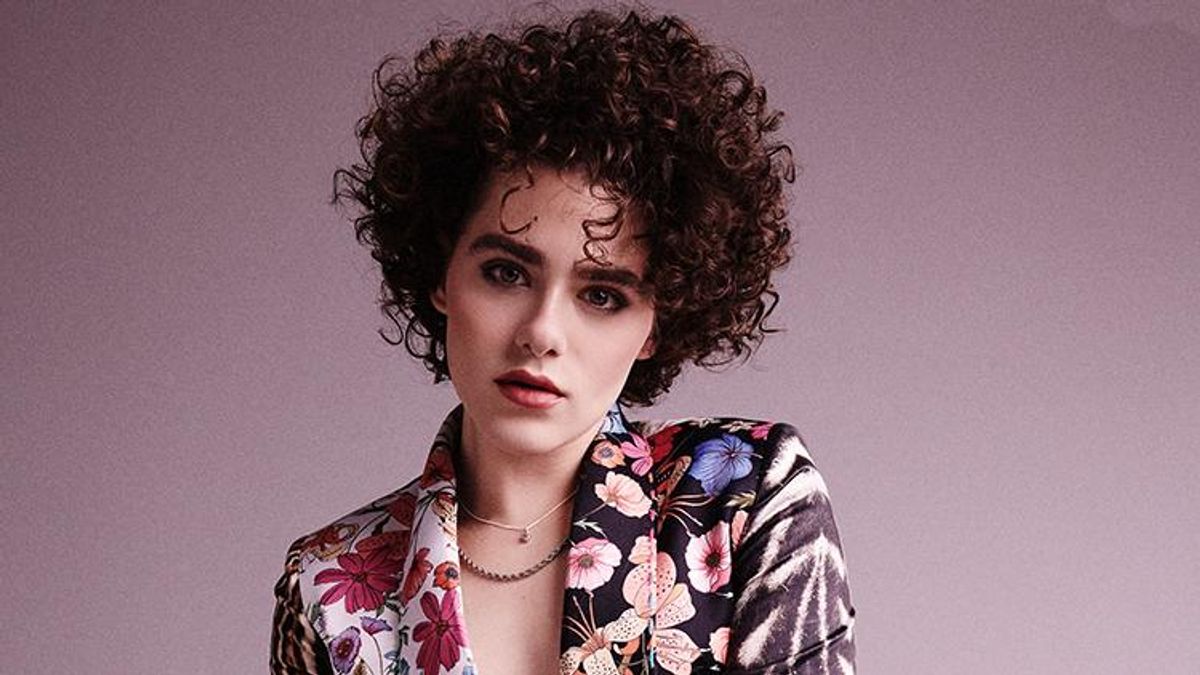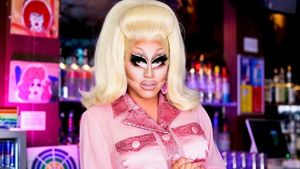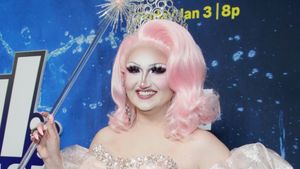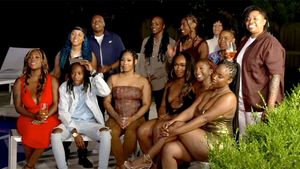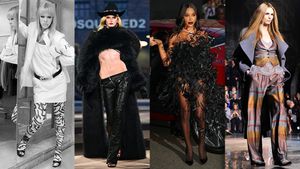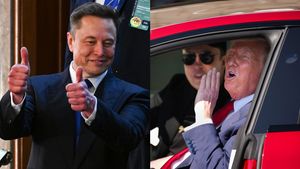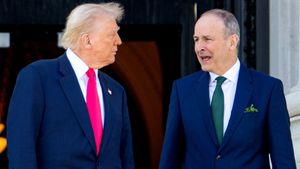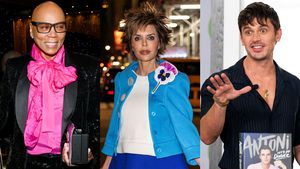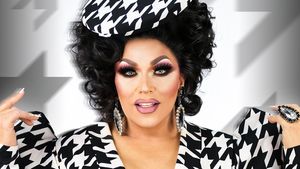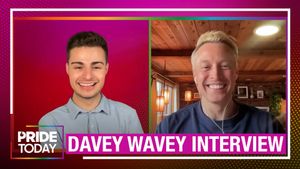When Misha Osherovich first read the role of Nolan in Peacock's original series The Girl In The Woods, it was truly like a dream coming true for the nonbinary actor. "It's one of those things where, as an actor, you read it and you go, 'this can't be real life'," they revealed to The Advocate, adding, "I couldn't contain the feels...I felt so seen." It was as if the character had been custom-written just for them, they felt. "We talk about wanting to feel seen and represented, but I actually don't know that before reading this script in particular, I felt such a singular...moment of feeling seen. That's what it feels like."
Their character, Nolan, is one of the three leads on Girl, and like Osherovich they're nonbinary; although in Nolan's case, they're still working on being comfortable in their gender identity -- as well as having it respected by the people in their life. It's an achingly heartfelt and essential narrative, with the added bonus of being part of a larger, fall-appropriate supernatural drama. In Girl, monsters are very much a real thing, but a cult-like colony has sworn to secretly keep them trapped behind a mysterious door in the woods. Carrie (Stefanie Scott), a runaway from the colony, has no choice to stay put in the nearby town and -- with the help of Nolan and Tasha (Sofia Bryant) -- fight back against some of the malicious creatures that have somehow escaped.
While it might at first appear to be a straightforward spooky teen drama, the behind-the-scenes talent of director/co-executive producer Krysten Ritter and queer trans writer J. Casey Modderno has infused the series with a queerness that makes it stand out from the typical young adult fare. Sexuality, gender nonconformity, and class issues take center stage as the kids battle demons both real and metaphorical. There's even a bit of a love triangle between the leads, so yeah, it's pretty much must-watch TV.
We chatted with Osherovich about what the role means to them, the profound and surprising ways they connect with Nolan, and the real-life monsters they've had to face in the past -- and how they are fighting back, even today.

Today's the premiere of The Girl in the Woods, which is so exciting! Do you have a plan for how to approach today?
I actually do, but it's very much kind of the anti-premiere if you will... I'm [sort of a] hippie-dippie new moon type human, and I very much look to the future. So...I'm actually taking today to take it very easy and do a little meditation, walk around, just remind myself that however the show ends up getting received, it was a magical process to work on -- because of all the magical queer emotional goodness.
Speaking of queerness, the series does something really interesting and I think important, in that it draws a very clear line between gender and sexual identity. As a non-binary person yourself, what did that mean for you?
I was so excited. I, as a queer human, I'm still figuring myself out. And so sexual fluidity is something that actually opened up for me when I kind of settled my gender identity. I'm like, "Oh, right, I fall outside of the binary, now I can do whatever the fuck I want!"
I personally believe that characters should be messy. Especially teenagers. Teenagers have the brains of young adults, the hormones of pubescent children, and all of the worst messy parts of being a young person growing up. So when shows kind of skim over that and make it all glossy and pretty, all hair gel and nothing else, I feel like they don't get the spirit of a teenager, right?
This messy sexual attraction, that's completely different from gender struggles, and in a love triangle with another completely outside human, yeah, that's teenager-dom to me. And I think that that's what sang to me when I read the script.

This is really underlined in the series in a scene where Nolan tries to clarify the difference between sexual identity and gender identity, and their father sort of laughs it off dismissively.
That scene actually might be one of my favorites because I had an amazing scene partner and the actor that plays my dad, he really fucking nailed it. But it's that disparity of, "I'm now in 2021 OK with my son, my cis son, being gay." Yeah, but [with] gender and a complicated conversation that, as an older cis parent, it probably makes the brain hurt a little bit. "Oh, no, that's not for me. That's a trend that'll pass." That microaggression is something that I know for me, it actually kind of brings me back to what the first time that I got misgendered.
I had just come out as nonbinary. It was during the pandemic, we were still not seeing that many people, and I ended up on a boat. You know, outside hanging out with a few safe people. And it was a new person, a new friend that I met and he was so excited to meet me, but the entire boat ride he was like, "Yeah, my man, Misha. My guy over here, like, isn't he the best?" And I'm -- you're listening to me now and I'm a relatively articulate person -- I froze.
My friend next to me had to hold my hand. It was a whole emotional thing and I realized in that moment as a newly nonbinary person, "Oh shit, that really hurts." It really hurts when your gender identity that you've worked pretty hard to kind of build for yourself gets completely invalidated.
It was just one of those kind of heartbreaking but exciting moments to read it in the script. Like yeah, that is how it goes, they often mean incredibly well and still it can go really wrong.
One of the most powerful moments in the series involves your character Nolan looking into the mirror and trying to "be a man" -- whatever that even means. Can you tell me more about the experience of filming that scene?
That scene, in particular, was a really magical kind of [collaboration] triad of me, Casey [Modderno] -- our powerhouse trans amazing queer showrunner -- and our director for that episode, Jacob [Chase].
So, everybody knew that a scene like that was going to get a little messy on the day -- as it should, but Casey [and I] sat down and went line by line in that scene to give me as many options as possible, because she wanted it to come off organic, too.
I then got to set and Jacob cleared the room. It was just me, the DP, and him shooting the thing. We even -- and this just speaks to the crew -- we were running late that day, and of course, on TV everybody wants to just get the shot but... a kind of hush fell over the crowd. Everybody was there for that scene, ready to make it happen and do as many takes we needed.
I credit that scene -- and kind of the whole back half of the show, especially with Nolan getting really emotional and, you know, dealing with monsters -- I credit the whole crew collectively with being able to pull that off and giving me space to pull that off.

On top of coming to terms with being non-binary, Nolan is also struggling with substance abuse. In the past, you've been open with your own similar experiences. Did you find going back to that place, even for a role, difficult?
It was a lot. Unfortunately, it was one of those things that sometimes I did carry home with me in terms of the weight of it...and look, I'm really proud of my sobriety. I treat my sobriety the same way that I talked about my issues with body image and eating disorder stuff, which is that I'm actively in recovery. It's something that I choose every day to be a part of, because it makes my life better, makes me better.
Nolan's struggle with substance abuse fell timeline-wise the same with me, my entire teenage years were spent in rehab and treatment facilities, from like, 15 to 18. It was tough...but I'm an actor, and I'm putting it on a screen and people are gonna watch it, right? That felt triumphant, that I get to relive it for a reason -- and for a damn good reason.
This isn't your first foray into the genre, as you previously starred in Freaky and NOS4A2. Why do you think horror resonates for queer people?
Horror is this amazing, fantastical realm where we get to explore all kinds of issues of people that are mostly on the outside of society. Through things like monsters and demons and other dimensions, we get to play with these people's struggles in a fantastical way. But the audience walks away thinking...and that, I think, is the holistic power of horror, it's being able to talk about people on the outside through a really entertaining lens.
To shift gears a bit, I wanted to ask you as someone who has previously spoken out about the experience of having gone through the abusive "troubled teen industry," your thoughts on Paris Hilton's press conference on Capitol Hill this week, as well as the proposed legislation that would establish a bill of rights for children placed in such facilities -- and provide for some oversight.
For me, it's kind of everything. I've been really lucky to start to work and collaborate with Paris' team and...I can only applaud her in the way that she's leveraging her public profile in such an amazing way.
If I thought that being misgendered and having my identity kind of even lightly trampled upon, felt invalidating... going through (in my case) three years of the troubled teen industry and being told for years afterward that it was normal, and I'm the crazy one and that's just what happens to bad kids. That is the worst form of societal gaslighting that I personally have ever experienced.
So, to see in the headlines somebody like Paris, people like the organization she's working with, Breaking Code Silence -- which I'm so proud to be working with, as well -- to see them making a change to help young people that should not have gone through what they went through and that was invalidated because of this really fucked up industry, it makes me feel whole. And it makes me feel like there's hope for teens that are currently struggling to find the mental health care that they need that actually helps them and doesn't break them.
It also puts a part of my history into perspective that finally makes me feel like I can heal. So, I'm so excited that they're in the headlines and in all the right ways. And if I and Paris, and Breaking Code Silence have anything to do with it, 2022 is going to be an even better year.

What do you hope queer audiences, in particular, will take away from The Girl in the Woods?
I hope that they see the messiness that I was talking to you about. I obviously believe that representation is important, but I'm realizing now as this role has allowed me to look back on baby Misha and look back on younger queer finding themselves Misha...that would have would have been so helpful but also just validating to me at the time is to see queer kids on TV kind of fucking up and being as much of a mess as I was. Because I think we get a little trapped in, you know, "nonbinary has to be this shape and this beautiful queer is only acceptable if it's in this Instagram post or with this filter." And I think we fall where people do fall victim to a lot -- if not more of -- the same beauty and social standards that really plague us as a social-media-driven society right now.
I hope that what they take away is that queerness is and should be messy, especially when you're just figuring it out. Otherwise, you're not going to find those little bits of yourself that you're super proud of that are kind of weird. I've started to congratulate myself on the weird messy parts of my queerness and not focus so much on trying to be the right kind of beautiful and the right kind of nonbinary because there isn't that, it doesn't exist. So, I hope they take away the messiness in all the right ways.
The Girl in the Woods is streaming now on Peacock. Watch the trailer below.
